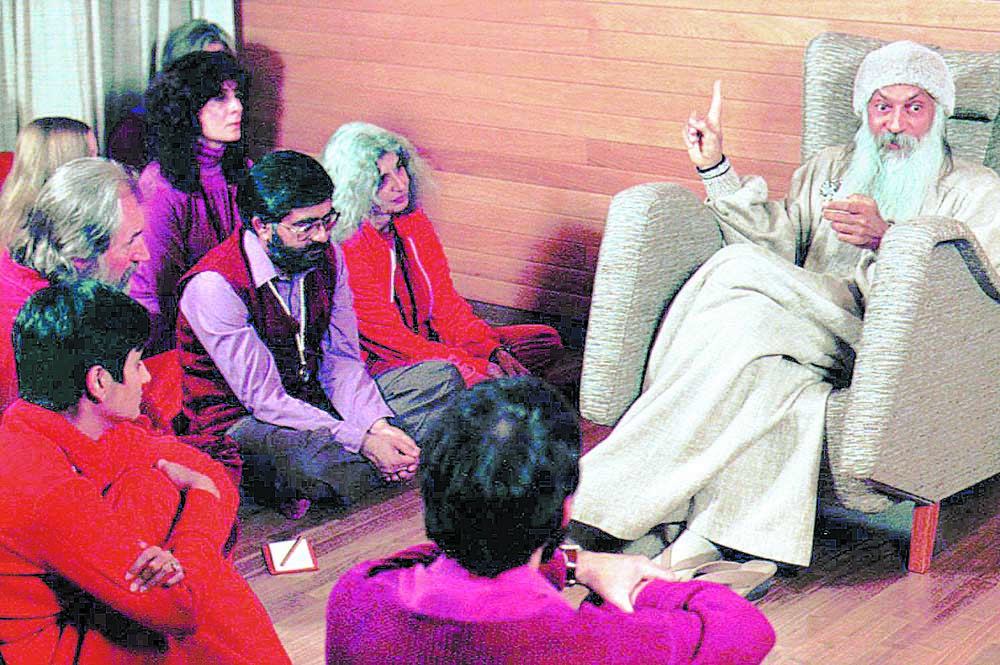Netflix documentary on Rajneeshees in Central Oregon revisits saga
Published 12:00 am Friday, March 16, 2018

- "Looking Back on Rajeneeshpuram" a lecture led by Rev. Scott Rudolph will be given Thursday at 7 p.m. (Submitted photo)
Oregonians who lived through the brief, tumultuous early 1980s residency of Bhagwan Shree Rajneesh — and his thousands of followers who set out to build a Utopian city on an old ranch in Central Oregon — remember it all too well.
There was the conflict with the folks in Antelope — population 40 — which led to the guru’s followers briefly taking over Antelope and renaming it Rajneesh; battles with the land use watchdog group, 1000 Friends of Oregon over the establishment of the city of Rajneeshpuram in a rural area; and the commune’s leaders bringing in homeless people from around the U.S. in an attempt to win a Wasco County election.
Trending
And how can we forget the poisoning of salad bars and other establishments, which sickened hundreds of people in The Dalles? Or the plots to assassinate Oregon government officials?
The six-part documentary series “Wild Wild Country,” which begins streaming on Netflix on Friday, revisits this story, which all these years later is still enraging and utterly fascinating.
In “Wild Wild Country,” directors Chapman Way and Maclain Way have access to tons of archival footage, because news organizations — both in Oregon and beyond — covered the Rajneeshee story in enthusiastic detail.
When the Bhagwan and his followers arrived in Oregon in 1981, it didn’t take long for locals to start hearing about the group’s free-thinking attitudes. The guru — who had stopped speaking in public by this point — presided over a community clearly identifiable by their clothing, all in shades of red, purple and pink.
The guru’s personal secretary, Ma Anand Sheela, delighted in saying provocative things. In one interview after another, Sheela called Oregonians who disagreed with her bigots. She dropped curse words on national television. She insisted she wasn’t interested in turning the other cheek when, after a Rajneesh-owned hotel in downtown Portland was bombed, the Rajneeshes armed themselves with high-powered weapons.
Some Oregonians may have resented it when the Bundys and their loyalists took over the Malheur National Wildlife Refuge in 2016, but that reaction was mild compared to the canyonwide gap between Rajneeshees who saw themselves as joyful and enlightened, and locals who suspiciously eyed them as dangerous interlopers.
Trending
That gulf comes to life in “Wild Wild Country” in the new interviews conducted with Oregonians such as Jon Bowerman, son of Nike co-founder Bill Bowerman, and former followers of the Bhagwan.
Sheela, now known as Sheela Birnstiel, is interviewed at her home in Switzerland, where she’s running homes for the aged and mentally disabled. In the series, she generally doesn’t take responsibility for the crimes she and other members of the community were eventually imprisoned for, though she does say, “I have to live with myself.”
Philip Toelkes, who was Swami Prem Niren when working as a lawyer for the Bhagwan, is still devoted to the guru’s spiritual teachings: “He remains the master of masters,” he says.
Jane Stork, an Australian who was a close associate of Sheela’s and says she only later began the process of “breaking the spell,” expresses a note of regret. Stork recounts how she and a group from the commune came to Portland with the intention of killing Charles Turner, U.S. attorney for Oregon. In another chilling moment, Stork describes her attempted murder of the Bhagwan’s doctor.
Les Zaitz — an investigative reporter and former staffer for The Oregonian newspaper who chronicled much of the story of the Bhagwan, his background and crimes committed by those around him — is also interviewed. Zaitz recalls detectives arriving at The Oregonian to inform the reporter that they had credible evidence that “I had been targeted for murder,” as Zaitz says.
Rajneeshpuram collapsed in 1985, as authorities sought to link commune leaders and members with food poisonings, murder plots, immigration fraud and other crimes. The Bhagwan was deported and returned to India, where he died in 1990. Sheela and others were convicted on various charges and served prison sentences. The nearly 70,000-acre Muddy Ranch in Wasco County, where the commune was established, is now the Washington Family Ranch, a youth camp and retreat center operated by the Christian group Young Life.








